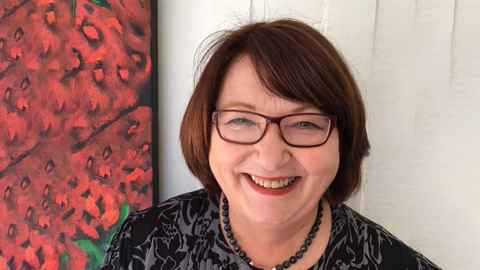Professor of Social Work celebrates progress in the profession
12 March 2019
A long and distinguished career in social work education and research spearheading major advances in the profession has culminated in Liz Beddoe’s appointment to Professor of Social Work.

The Faculty of Education and Social Work’s newest professor Liz Beddoe is passionate about social work education and is proud to have been part of key changes that have advanced social work knowledge over the last 40 years.
Professor Beddoe has contributed significantly to moving the profession from being largely unqualified and unregistered, to one where practitioners are required to do a four-year degree or two-year masters. Legislation on mandatory registration for social workers, a cause she has championed, is currently going through parliament and is likely to be law in a few months.
“What that means is that people can’t call themselves a social worker until they’re registered, which provides a great deal of protection for the public and for employers – someone who is qualified and accountable to the ethics and standards of the profession.” Professor Beddoe was instrumental in developing many of the policies and protocols as a member of the inaugural Social Workers Registration Board from 2003 to 2006.
As a self-confessed “energiser bunny”, she has played a leadership role over three decades in shaping social work policy, research and teaching. She served on the national executive the Aotearoa New Zealand Association of Social Workers for many years, including a term as Vice President, and was made a life member in 1990. She’s also been at the forefront of building a community of academics and practitioners advancing ideas and debate about social work.
It’s about going beyond what you do in your own little office to be part of bigger teams and create really interesting projects and outcomes.
As head of social work for over 10 years, Professor Beddoe was a driving force in taking social work from being a two-year diploma in the Auckland College of Education to a point where the University of Auckland now has a full suite of social work programmes up to PhD level. “We’ve now got a great PhD cohort, and for me that’s a real satisfaction.”
Becoming the third Professor of Social Work in the University, and one of only eight in the country, adds to the visibility of the field within academia. “It’s a real achievement. I was absolutely delighted. It’s nice after such a long career in the profession to feel that my work’s been recognised and respected.”
Starting out as a health social worker in the late 1970s, Professor Beddoe has a strong practice base of 14 years in the field, specialising in women’s health. She’s been teaching since 1994, and still finds “joy” in teaching and research and supervising students. “That’s what gets you out of bed in the morning. I’m still loving what I’m doing.”
Her own research has led her to build international collaborations and be part multi-country teams working on some of the most pressing issues in social work. She’s on international advisory boards for Australian Social Work, International Social Work and the Asian Social Work and Policy Review. “It’s about going beyond what you do in your own little office to be part of bigger teams and create really interesting projects and outcomes.”
It’s not an easy field to get into academic life. It’s really competitive… It’s
great when you go from supporting people to write, recommending them and then seeing them getting invitations and opportunities in their own right.

The connection between research and practice is important to her. Most of the students she supervises are practitioners or leaders in social work settings. “There’s a real excitement about generating research that’s in the field and not remote from everyday practice: knowing that people take that research back to colleagues.”
Building the knowledge-base of the social work profession is a strong motivation. “Education doesn’t stop when you get your ticket.” While Professor Beddoe celebrates the fact that social workers are increasingly undertaking further study, she would like to see more funding from employers.
“At the moment we have people paying their own fees and taking annual leave to do qualifications, even when they are training for roles that are of direct benefit to the employer such as the Postgraduate Diploma in Professional Supervision.” She contrasts it with other professions such as nursing or medicine where there’s an expectation of constantly upgrading your knowledge.
Professor Beddoe’s passion for making research more accessible means that that as part of editorial collective of the Aotearoa New Zealand Social Work journal (which she now edits) she supported the decision to make the journal open access so that social workers didn’t have to belong to a research institution or pay to read it. “It’s free. It’s easy. It’s on their phones.” It’s also made the journal more international, since researchers and practitioners around the world can access it.
Allied to that, she’s been instrumental in developing social media platforms to encourage practitioners to discuss social work and the issues it faces. She’s a founding member of the Re-Imagining Social Work Collective whose blog champions discussion about progressive, inclusive and culturally responsive social work. “It’s generated more debate. We’re better connected. We use social and digital media to do more things collaboratively.”
In the role of professor, Liz relishes the requirement to mentor and support early career researchers, something’s she’s always strived to do. “It’s not an easy field to get into academic life. It’s really competitive… It’s great when you go from supporting people to write, recommending them and then seeing them getting invitations and opportunities in their own right.”
Looking to the future, Professor Beddoe is still full of enthusiasm and excitement for her work. She does look forward, though, to resisting the urge to over-commit and saying yes to every opportunity. More of a work-life balance is the aim.